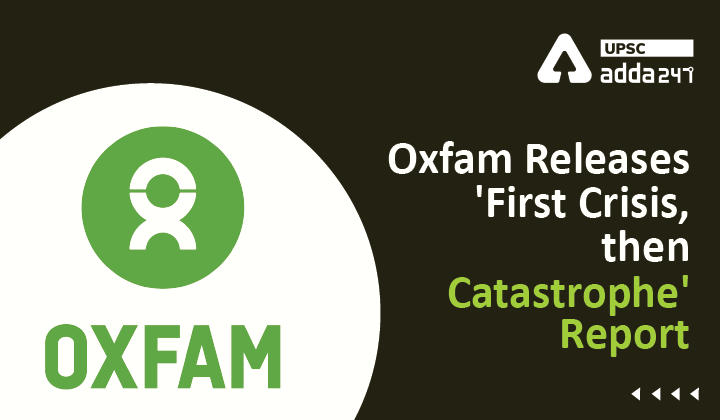Table of Contents
Oxfam report: Relevance
- GS 2: Issues relating to poverty and hunger.
Oxfam report: Context
- Recently, Oxfam International has released a report titled, ‘First Crisis, then Catastrophe’ where it has alarmed that a quarter of a billion people could be pushed into extreme poverty in 2022.
ऑक्सफैम ने ‘फर्स्ट क्राइसिस, दैन कैटास्ट्रोफे’ रिपोर्ट जारी की
Oxfam inequality report: Key points
- Multiple crisis: The crises of extreme inequality, unprecedented food and energy price inflation accelerated by the war in Ukraine and COVID-19 are that multiple crises that are converging to create a catastrophe for the world’s poorest people.
- The combined impact of COVID-19, inequality and food price hikes could result in 263 million more people living in extreme poverty this year, resulting in a total of 860 million people living below the $1.90 a day extreme poverty line.
- These multiple crises are hitting an already deeply unequal world, which is being torn apart further by the COVID-19 pandemic.
Income inequality in 2022
- A huge increase in extreme poverty expected: Rise in food and energy prices due to COVID-19 and war in Ukraine has accelerated the poverty trend in the world.
- Falling and stagnating wages: International Labor Organization (ILO) has found that COVID-19 has led workers to accept shorter hours and wage cuts. There are concerns that inflation in 2022 will outstrip wage growth, which means reduced real income growth for workers against the soaring cost-of-living.
- Governments on the edge of bankruptcy: COVID-19 has stretched the finances of governments worldwide to the limit. The cost of the recession caused by the pandemic was immense, and the actions taken to tackle the impacts on people by many governments cost a lot of public money, and drove up levels of public debt.
- Soaring corporate profits at a time of crises: Oxfam reported that 32 of the world’s largest companies saw their profits jump by $109 billion in 2020.
Oxfam report: Proposed solutions
- Protect the poor from inflation: Meeting the extraordinary demands of the time, governments should seek to control food and energy prices directly.
- Cancel unpayable debts to poorer countries: The G20 must prioritize the debt agenda and cancel all debt payments in 2022 and 2023 for all low and lower-middle-income countries that require it.
- Taxing wealth: Countries should consider imposing emergency solidarity taxes or one-off wealth taxes, or temporary increases in capital gains taxes or personal income taxes on high incomes.
- Reallocate and re-issue Special Drawing Rights: Rich countries must reallocate at
least 25% of their SDRs to developing countries in a way that is debt and conditionality-free. - Increase life-saving emergency aid to poorer countries: Building on their existing aid commitments, rich country donors must provide immediate emergency support to lower-income countries.
Read current affairs for UPSC





 TSPSC Group 1 Question Paper 2024, Downl...
TSPSC Group 1 Question Paper 2024, Downl...
 TSPSC Group 1 Answer key 2024 Out, Downl...
TSPSC Group 1 Answer key 2024 Out, Downl...
 UPSC Prelims 2024 Question Paper, Downlo...
UPSC Prelims 2024 Question Paper, Downlo...
